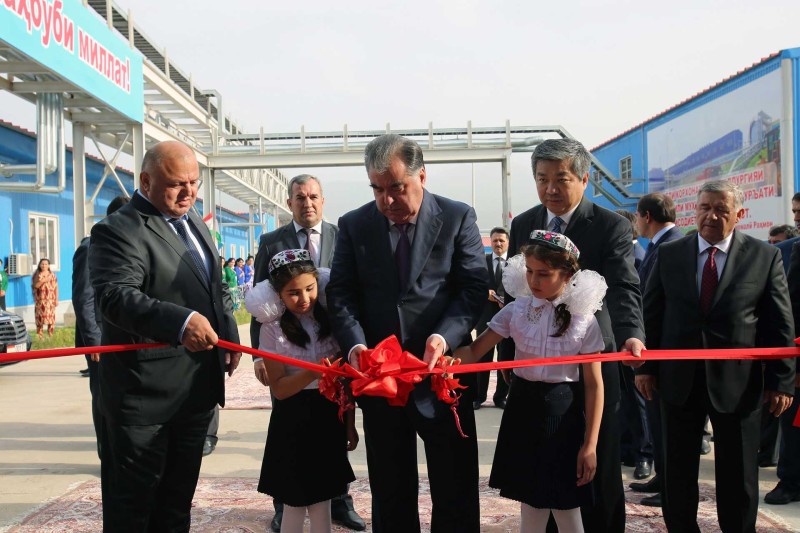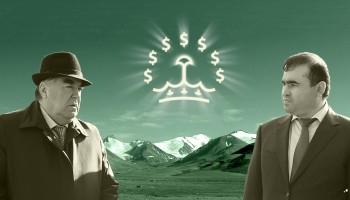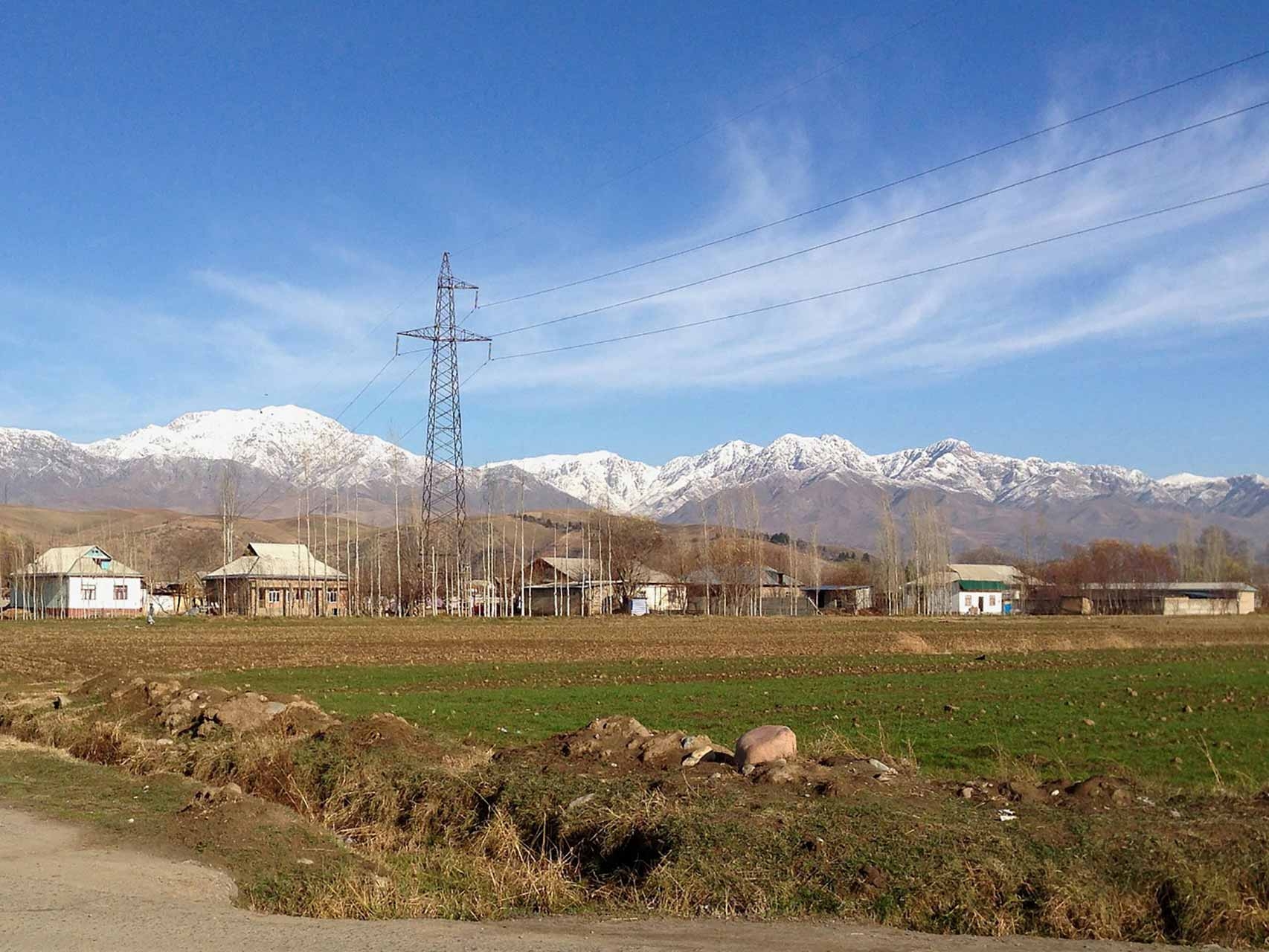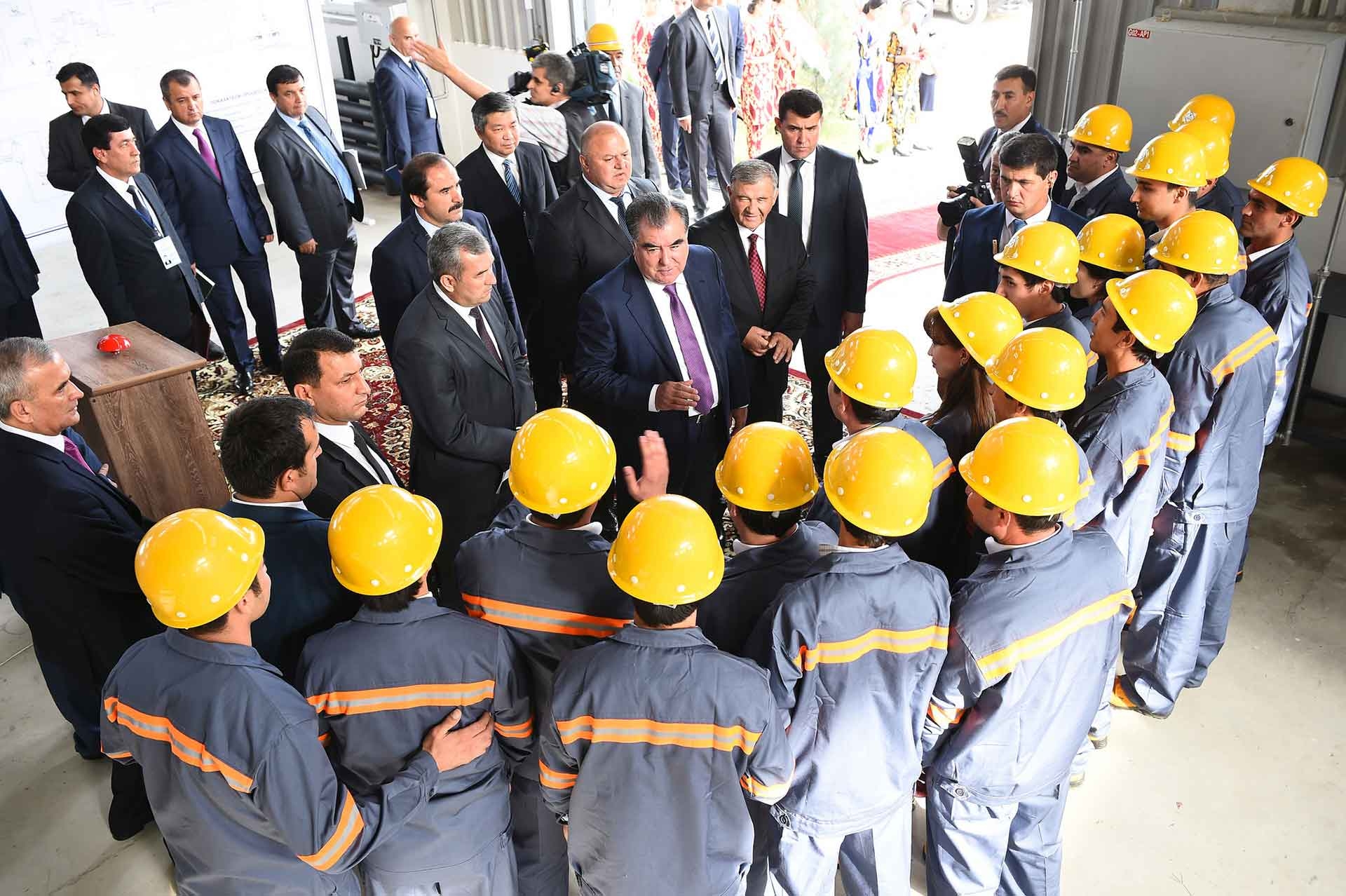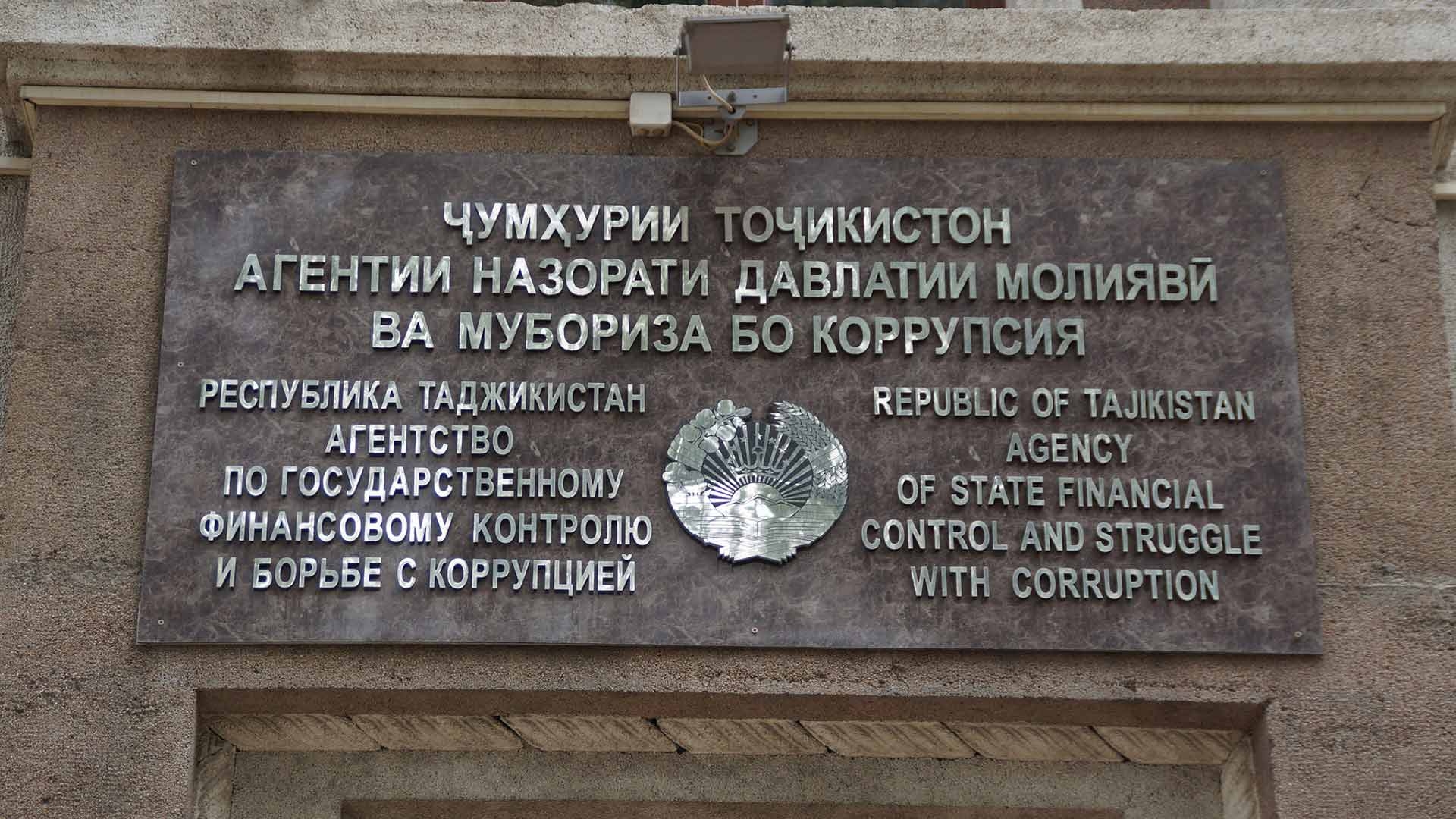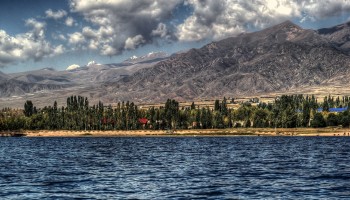Sitting in rows upon rows of plastic blue chairs, hundreds of men and women in colorful traditional dress listened attentively to their president. Known in his country’s press universally as the “Founder of Peace and National Unity” (the use of the title is enforced by decree), Emomali Rahmon was busy making a grand announcement: A new gold processing facility was open for business.
Accompanied by two little girls, the president cut a red ribbon that marked the opening of the “Pakrut” facility in Vahdat, a district about 120 kilometers northeast of the capital of Dushanbe. The official press release promised that the new plant would provide well-paying jobs for locals and help develop Tajikistan’s economy.
Given Rahmon’s longtime political control of this poor, authoritarian Central Asian country, it was no surprise that the June 2016 announcement noted that the facility had been made possible “with the president’s support.”
But, as a new investigation by the Organized Crime and Corruption Reporting Project (OCCRP) shows, President Rahmon’s support had come at a price. As it turns out, after years of doubt and delay, the foreign company that built the factory — a UK-traded firm with majority Chinese ownership — had paid a “success fee” to a company controlled by the president’s son-in-law, Shamsullo Sakhibov.
China Nonferrous Gold Limited (CNG), which is traded on the London Stock Exchange’s Alternative Investment Market (AIM), paid at least US$ 2.7 million to secure the license that allows them to mine gold in the country. (At the time, the firm was operating under the name Kryso Resources PLC.)
After reviewing documents obtained by reporters, Daniel Balint-Kurti, Head of Investigations at Global Witness, a London-based anti-corruption NGO, said that the payment could be illegal and should be investigated by the authorities.
“Such a payment would surely run a risk of falling foul of the UK bribery act, especially given that Kryso Resources is UK-registered,” he said.
Neither Sakhibov himself nor the Tajikistani government responded to requests for comment.
The Kryso story illustrates the extent to which foreign firms, including those based in Western capitals, are complicit in the corruption that plagues small, undemocratic developing countries — especially those with significant mineral resources.
In fact, Kryso wasn’t even the first foreign mining company that would make questionable payments to gain access to the wealth buried beneath the Gissar mountain range.
Gold Under the Mountains
Tajikistan is the poorest country in Central Asia, its economy dependent on remittances worth millions of dollars from migrant laborers who toil in neighboring Russia. But the potential for great wealth is there.
It was recognized even back in the Soviet era, when geologists dispatched from distant Moscow first surveyed the Gissar range.
But it wasn’t until the mid-1990s, after the civil war that followed Tajikistan’s independence abated, that foreign adventurers would get a chance to try their luck mining for gold in the heart of Central Asia.
One of them was Craig Brown, a young accountant from New Zealand who came to Dushanbe in the employ of Nelson Resources, a resource extraction company listed on the Toronto stock exchange.
In Tajikistan, Brown found not only a job and a wife, but also the high-level connections that would eventually enable him to strike out on his own.
By 2001, he had worked his way up to the position of CFO at another Canadian company, Gulf International Minerals, that also had gold exploration interests in Tajikistan.
Three years later, according to 2004 reporting by the Globe and Mail, Brown’s Tajik contacts paid off. Working now as a consultant for Gulf International, he managed to secure a valuable exploration license to the Pakrut gold field from the country’s government. But he made sure the license would be held not by Gulf but by him personally, registering an offshore company in the Bahamas for that purpose.
According to an independent investigation by Deloitte, Brown then tried to sell the license to his employer for $3.2 million, offering half of the proceeds to the company’s COO, Alastair Ralston-Saul (who attempted to bribe two of the company’s board members to get their approval.)
But the potential deal was derailed after it was discovered by the company’s board, which initiated the Deloitte investigation. Ralston-Saul resigned in disgrace, leaving Brown to walk away with no money, but with the valuable license still in his possession.
The Deloitte audit also pointed out another irregularity, citing “cash disbursements allegedly [made] to Tajik nationals” with no supporting documentation. According to the audit, these were described as “co-operation payments” on expense reports. Deloitte was unable to determine whether these constituted violations of Canada’s Corruption of Foreign Public Officials Act due to the lack of documentation.
Tajikistan is a particularly difficult business environment. Regional experts have reached the conclusion that the country is a no-go zone when it comes to foreign investors who want to operate cleanly. “Most international investors do not view Tajikistan as a viable place to do business … would-be investors, large and small, find themselves stymied by corruption at all levels,” concluded a 2008 US diplomatic cable published by WikiLeaks.
Perhaps that’s why, years later, Brown’s next company, Kryso, would channel millions to the president’s son-in-law. This time, instead of a “co-operation payment,” the transaction would be described as a “success fee.” But the principle — paying off influential contacts to ensure the desired outcome — was the same.
The Kryso Connection
Kryso Resources – founded in 2004 in the UK – was Brown’s second attempt to take advantage of the Pakrut field. (He even attracted some executives from his former employer, making them board members of his new enterprise.)
But this time, rather than trying to sell the license, Brown decided to mine the field himself.
To secure enough capital for what would inevitably be an expensive and lengthy endeavor, he took his new company public, this time on AIM, the London Stock Exchange’s market for high-risk, high-reward international stocks.
“The [London] AIM markets are particularly problematic,” says Nick Mathiason, the founder of Finance Uncovered, an organization that helps journalists and activists investigate illicit finance. “A lot of extractive companies with interests in kleptocratic states [are] raising financing here. By doing so, [they] get a stamp of respectability.”
Kryso started strong. The company’s 2004 prospectus — a document designed to convince investors to purchase its shares — made clear that it already enjoyed a certain level of access in-country.
“The Company’s executive Directors have a proven track record of operating in Tajikistan,” the document states. “The Directors believe that Kryso Resources is the first foreign company to obtain a 100 percent interest in a mining and exploration project in the country.”
The prospectus makes sure to note Kryso’s possession of the Pakrut exploration license, which included the gold deposit and 6,300 surrounding hectares.
Initially, Kryso raised enough money to actively pursue its exploration of the Pakrut’s licensing area, drilling dozens of holes and obtaining favorable new estimates of the project’s profitability. The company also pursued other opportunities, beginning a nickel mining exploration project nearby.
The 2008 financial crisis put a squeeze on Kryso’s fundraising, forcing it to “scale back its activities” and look for additional sources of funding. But soon enough, a Chinese state firm called China Nonferrous Metals International Mining Co came to the rescue, lending the company millions of dollars to continue its work.
That’s when Kryso hit another problem – one that would take one of Brown’s connections to resolve.
After seven years of exploration — and promises that gold production would soon begin in earnest — Kryso was forced to deliver bad news to its shareholders in its 2011 half-annual report: The company faced a likely delay in receiving a full-fledged mining license, which was required to move on from the exploration phase. This, the company explained, would have a “knockon” effect on its plans. The note added that the license application was awaiting approval at “the presidential level.”
As it turned out, a risk they had been aware of all along had proved true.
As far back as 2004, the company had noted in its prospectus that its ability to go into full production would be “subject to the discretion of the applicable governments or governmental offices.” In nearly every subsequent annual report, Kryso continued to warn that its success would depend on the good graces of officials.
“The Government of Tajikistan exercises control over such matters as exploration and mining licensing, permitting, exporting and taxation, which may adversely affect the Company’s ability to carry out exploration, development and mining activities,” read the company’s 2010 report.
Then the situation was suddenly resolved.
A Fee for Success
In November 2011, President Rahmon finally gave his approval, and two months later, the Ministry of Energy and Industry granted Pakrut (Kryso’s local subsidiary) a gold mining license valid until 2030 that allowed the company to mine more than 1.3 million tons of ore per year.
How did Kryso manage to solve the problem so quickly?
This is where the “success fee” comes in.
The company’s 2012 annual report mentions that that January — the same month it received the license — it awarded a Tajikistani company called LLC Anbat Service 8.2 million shares to “settle a liability” of over $2.7 million “relating to a success fee in connection with the issue of the Pakrut Project mining license.”
In effect, this means that, in a previously-agreed arrangement, Kryso had promised Anbat Service a payment (of an unknown amount) in return for obtaining the mining license. The shares it handed over that January settled the $2.7 million it owed on the fee.
The payment may well have remained secret if it had been made entirely in cash — in that case, Kryso would have faced no obligation to disclose it. It was only because a portion of it was paid in shares that it appeared in an annual report.
What is Anbat Service, and how did it manage to solve Kryso’s licensing problem after more than a year of failed efforts?
A Kryso press release describes Anbat Service simply as a Tajikistani consulting company, acknowledging the “significant and essential in-country legal, financial and PR consultancy services” it received from the company “as part of detailed process of obtaining the license.”
But OCCRP reporters found that Anbat is actually a subsidiary of Faroz, a major Tajikistani conglomerate with interests in oil, gas, tourism, and foreign trade. Faroz is owned by Shamsullo Sakhibov, who is married to the president’s daughter Rukhshona. In less than a decade — and with the personal support of President Rahmon – the company has become the dominant player in a wide variety of Tajikistani industries.
It’s no wonder that a foreign company struggling to obtain a license that requires the president’s attention would pay millions to Anbat Service, a company firmly entrenched in Sakhibov’s network. Such practices are a necessity in a country where the entire political system and all major businesses are controlled by the president’s family.
As a 2008 US diplomatic cable published by WikiLeaks explains, “…the Government believes foreigners should come invest here, but with no strings attached, i.e. that well-connected Tajikistanis should continue to control all businesses in the interest of narrowly-defined personal gain.”
Asked by reporters about his relationship with Sakhibov, Brown said that he knew him personally through social functions at the Tajik Embassy in London, which he and his Tajik wife often attended. At the time, Sakhibov had a position in the embassy as his country’s trade attaché in the United Kingdom. He left London in January 2017 and was not reachable for comment.
Asked about Kryso’s delayed mining license, Brown described a frustrating process of repeatedly lobbying various government departments, multiple meetings with ministers, and finally seeking help from Tajikistan’s ambassador.
As for Sakhibov, Brown described him as “a nice guy, a businessman” who was actively helping foreigners interested in investing in Tajikistan. “If anyone had any problems,” Brown recalls, “he would welcome them into his office and try to sort things out, make telephone calls.”
Nevertheless, he denied receiving any help from Sakhibov regarding Kryso’s delayed license.
Brown also refused to comment about his company’s relationship with Anbat Service, citing a non-disclosure agreement.
Balint-Kurti, the Global Witness investigator, found the arrangement problematic. “If it is indeed true that LLC Anbat Service is owned by the son-in-law of the president of Tajikistan, this would raise a serious corruption risk,” he said.
“It is important that AIM Regulation and the UK authorities investigate this deal, including the beneficiaries of the success fee,” he added.
Having secured the license, Brown was ready to move on to his next endeavor. In 2013, Kryso’s Chinese investor – the state-owned China Nonferrous Metals International Mining Co — bought him and the other Gulf alumni out, increasing their stake in the company to 38 percent and changing the company’s name from Kryso to China Nonferrous Gold Limited.
It’s unknown whether Anbat Service still owns the shares it received, or, if they were sold, how much Sakhibov may have profited.
The company’s ownership structure is secretive. Over half of the company’s shares are held by six so-called “nominee service companies,” meaning that their true owners are unknown.
Brown was out of Kryso – but his relationship with Sakhibov was only beginning.
A New Mining Deal
Just a month after handing over the shares to Anbat Service, Brown went on to establish a separate mining venture with Sakhibov. The business relationship between the two men was hidden, conducted through an offshore firm registered in the British Virgin Islands. As with Kryso, this endeavor also involved using Sakhibov’s connections to ensure the receipt of a mining license.
This is revealed in the Panama Papers, a leak of internal records from Mossack Fonseca, an offshore law firm, which were obtained by the German publication Suddeutsche Zeitung and shared with the International Consortium of Investigative Journalists (ICIJ) and OCCRP.
The records show that Sakhibov and Brown set up two separate companies in the BVI (Glatto Management and Ibstock Equity Limited, respectively) which then became the cofounders of Primus Resources, registered in the UK.
Brown described Glatto’s role in the venture as that of a facilitator. “They run around trying to solve your problems and normally you pay them a fee – they charge you an hourly rate,” he said.
Brown explained that the company’s representatives told him, “we’ll take a share in the company in return for helping you get a license.”
It seems to have worked.
That July, a draft government resolution was published in the official gazette on issuing an exploration license to Primus’s new local subsidiary, Koni Nur, to look for gold in the Ukobkhona and Pindar gold deposits, some 140 kilometers to the north of Dushanbe.
Brown told reporters that he found out about this field from his earlier experience working in Tajikistan in the 1990s. Back then, he said, the deposit had not been economically viable due to low gold prices.
But, though Brown acknowledged that Glatto had been instrumental in helping his venture obtain this license, he claimed to be surprised at the news that the company was owned by no one else but Sakhibov, the president’s son-in-law, who, he had just paid a very substantial “success fee” in his other venture.
Oddly, Brown claimed that he never knew that Sakhibov was Glatto’s sole shareholder. He explained that, on the Primus project, he dealt with a man named Azamat Kasymov, Faroz CEO, and that it was Sakhibov who had introduced them.
“I didn’t know it was [Sakhibov’s] company, I thought it was Azamat’s company,” said Brown. “I didn’t really know who was behind it.”
However, the Glatto files show that the company was not only owned, but managed by Sakhibov at the time Primus was incorporated. Kasymov only became director of the firm a year later, after Sakhibov had resigned from the position.
Unfortunately for Brown, the ill-fated gold deposit once again turned out to be economically unviable — this time unrelated to gold prices.
Brown explained that, in 2012, the Tajikistani government passed a new law that required companies to support local communities, which didn’t seem to go well with the partners in the new mining venture.
“You are not going to take on a small exploration project and commit to spending $500,000 to build schools and hospitals,” Brown said.
He was finally out of Tajikistan — but Faroz, Sakhibov’s company, is flourishing. It received a license to mine this very same gold field last year. The company did not respond to requests for comment.
As for China Nonferrous Gold, despite its success in winning its long-sought-after mining license, its fortunes have not turned for the better.
An avalanche and landslide in early 2017 destroyed the mine’s power supply and several buildings and damaged its tunnels, seriously impacting its gold exploration attempts. The company intends to resume production this year. Thus far, it has sold 162 kilograms of gold to the Tajik Central Bank for a total of $5.49 million.
Additional reporting by Sinead Carolan, Eleanor Rose, Lejla Sarcevic, Lejla Camdzic.
